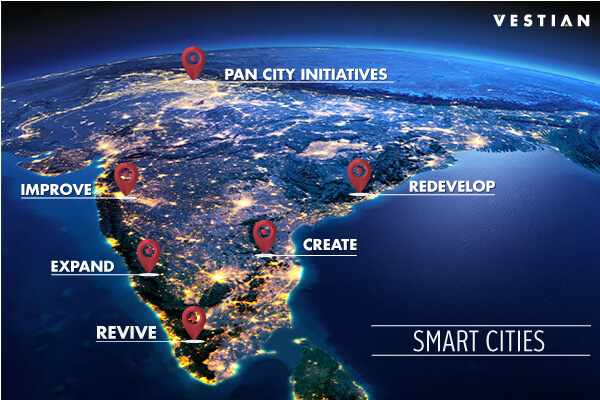3rd article in the series features various strategies adopted by the Smart Cities’ Mission to improve, revive, extend & create a smarter India
Technology with democratic governance has paved a way for economic growth in India. The Smart Cities Initiative aims to rejuvenate the identity/ character of many existing Tier 1, Tier 2 cities and sub-divisional towns as self-sufficient regional hubs. The mission involves area-based developments such as city improvement (retrofitting), city renewal (redevelopment), city extension (Greenfield development) and Pan-city initiatives.
City Improvement (Retrofitting)
Retrofitting of areas more than 500 acres will be identified through strategic selection in consultation with citizens. The existing infrastructure in these cities largely remains intact and only needs to be upgraded to achieve the objectives & efficiencies of a Smart City. It involves planning & incorporation of certain aspects in an existing built-up area to make it more liveable. Projects approved in these cities can be completed within a short duration of time. Maharashtra Government’s objective to transform of the Aundh- Baner-Balewadi (ABB) region in Pune is a prime example approved by the Smart cities’ Apex committee. Smart initiatives like ABB Punetel card for better city governance; sanction of e-buses, e-rickshaws, dedicated cycle tracks for improved inter-city mobility alongside water management & recycling tactics will be witnessed across this region in the next 5 years. Apart from Pune, Bhubaneswar, Guwahati & New Town- Kolkata are following the same strategy as well.
City Renewal (Redevelopment)
An existing built-up environment will be replaced and enable co-creation of a new layout with enhanced infrastructure. This strategy envisages mixed land use within a city and targets areas more than 50 acres as identified by Urban Local Bodies (ULBs) and the citizens. A new layout plan of the identified area will be prepared with mixed land-use, higher FSI and high ground coverage to drive renewal and incorporation of sustainable practices & governance. Both Agra & Varanasi will be redeveloped with the inclusion of renewable energy, technological modernization & sustainable infrastructure projects. Ujjain & Indore in Madhya Pradesh and Ludhiana & Amritsar too are being redeveloped along the same lines.
City Extension (Greenfield Developments)
Greenfield developments comprise of sub-divisional towns, with a population between 1-4 million that are of religious or touristic significance. It targets more than 250 acres of previously vacant area using innovative planning, financing & implementation tools. Cities will be constructed from scratch through land pooling & land reconstitution to create affordable housing and also address the expansion needs of industrial growth. Unlike retrofitting and redevelopment, Greenfield developments could be located either within the limits of the ULB or within the limits of the local Urban Development Authority (UDA). The ancient city of Thanjavur, formerly called Tanjore, is surrounded by a number of temples that fall under UNESCO’s World Heritage Monuments. Interestingly, the city is also an important agricultural centre on the Cauvery delta and will witness incorporation of smart solutions like Solid Waste Management, Storm Water Drainage, Housing, amenities related to recreational activities and Non-Motorized Transport in the next 5-year period.
Pan-City initiatives
Pan-city development envisages application of selected Smart Solutions to the existing city-wide infrastructure. Application of Smart Solutions will involve the use of technology, information and data to make infrastructure and services better. Applications of these solutions in the transport sector (intelligent traffic management system) to reduce the average commute time and/ or cost to citizens; or waste water recycling are initiatives that will positively impact the productivity and quality of life of the citizens. In the next 5 years, the public transportation system across Lucknow is to be completely revamped with inclusion of e-ticketing facilities &smart cards. Additionally, bus stops will include real time service trackers that will run on solar energy while the buses will be GPS enabled and bear CCTVs for better security.
These steps are anticipated to create and re-energize the entire eco-system of the city, strengthen its governance and improve the basic quality of life.
In the next part, we will explore the various Government initiatives & funding that support development.
